Zanzibar. I don’t know what it means in Swahili, but it could very well translate as “heaven.” In case you were wondering, the real Swahili word for heaven is “peponi.” The waves are rolling in beneath my balcony over the Indian Ocean. The sun is setting on small wooden dhow boats with their single sails gliding over the unreal turquoise blue waters. There’s a slight smell of campfire from a lobster BBQ on the beach. And the beach – oh the beach. Last year I decided the sand was as soft as flour. This year, I think it’s more like powdered sugar – another year of waves grinding those grains into a fine dust has taken effect and the results are… heaven. Maria says that places like Zanzibar are God’s gift to travelers. Zanzibar makes all of the cold showers, bumpy roads, bush toilets, rats, and mosquitoes worth it.
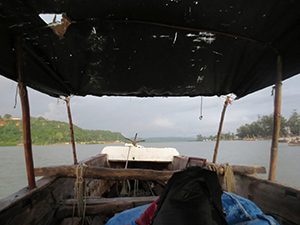 Our trip to Zanzibar was an adventure. OK, our whole trip is an adventure – the boat trip was just a mini-adventure within the larger adventure. We decided that flying to the beautiful tropical island off the coast of Tanzania was too mundane and conventional. So we booked a boat this year. Notice I didn’t say ferry. Our boat was closer to rowboat than ferry status. It was an unfinished wood shell, unfinished wood interior, lumber seats, held together with rusty nails, and big enough to just hold the eight of us, our luggage, plus the two person crew. It would have failed any US inspection – but it seemed to float, although there were a couple of people bailing the water out of it when we got there. It had a small motor – lawn mower size – and a mostly-intact awning to protect us from the sun. I don’t think most Americans would have looked at our boat and thought it was sea-worthy. Yet it puttered across the ocean, through deep swells for four hours to deliver us to Zanzibar. It sounded like we were going to run out of gas about a mile from shore. But somehow we sputtered onto the beach. Impressive. Maria had boated to Zanzibar several times in the past, but I had only flown. There’s something to be said for feeling every wave of the journey. By the time you arrive in Zanzibar, every fiber in your being (and your butt) has felt the transition, and you’re ready to experience a new place.
Our trip to Zanzibar was an adventure. OK, our whole trip is an adventure – the boat trip was just a mini-adventure within the larger adventure. We decided that flying to the beautiful tropical island off the coast of Tanzania was too mundane and conventional. So we booked a boat this year. Notice I didn’t say ferry. Our boat was closer to rowboat than ferry status. It was an unfinished wood shell, unfinished wood interior, lumber seats, held together with rusty nails, and big enough to just hold the eight of us, our luggage, plus the two person crew. It would have failed any US inspection – but it seemed to float, although there were a couple of people bailing the water out of it when we got there. It had a small motor – lawn mower size – and a mostly-intact awning to protect us from the sun. I don’t think most Americans would have looked at our boat and thought it was sea-worthy. Yet it puttered across the ocean, through deep swells for four hours to deliver us to Zanzibar. It sounded like we were going to run out of gas about a mile from shore. But somehow we sputtered onto the beach. Impressive. Maria had boated to Zanzibar several times in the past, but I had only flown. There’s something to be said for feeling every wave of the journey. By the time you arrive in Zanzibar, every fiber in your being (and your butt) has felt the transition, and you’re ready to experience a new place.
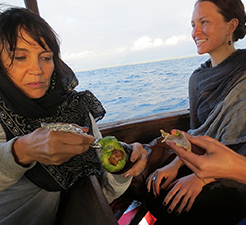 I was impressed with the ingenuity of Chelsey on the boat. Breakfast was provided, chapatti, hard-boiled eggs, and avocado, but there were no utensils. Thus, Chelsey peeled the avocado, and then fashioned a spoon from tin foil so that others could scoop avocado onto their chapatti. Chelsey is going to climb Kilimanjaro after we finish the trip. With skills like that, I think she’ll be fine.
I was impressed with the ingenuity of Chelsey on the boat. Breakfast was provided, chapatti, hard-boiled eggs, and avocado, but there were no utensils. Thus, Chelsey peeled the avocado, and then fashioned a spoon from tin foil so that others could scoop avocado onto their chapatti. Chelsey is going to climb Kilimanjaro after we finish the trip. With skills like that, I think she’ll be fine.
Zanzibar doesn’t feel like the rest of Tanzania. While I find all of Tanzania beautiful, Zanzibar is stunning. And it’s got a culture all its own. There are the beaches, which are primarily populated with mzungus (white people) and vendors hawking souvenirs; there are the spice farms, which export coffee, clove, turmeric, vanilla, cinnamon, saffron, ylang ylang, and other delicious spices; and there’s Stone Town, the Arab/Persian/Indian city, which is the major trade center – and was the center for slave trade not so very long ago.
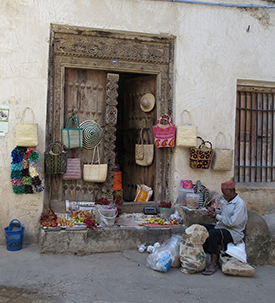 After beaching the boat in the beach town of Nungwe, we went to Stone Town for coffee and crepes, and a little bit of shopping. Stone Town is a maze of tall buildings and narrow alleys – and it’s not for the directionally challenged. Narrow, haphazard streets with no signs, many looking just like the last, leave you confused and disoriented. God forbid you don’t understand Swahili directions because you may wander the maze of streets for days – getting directions from strangers is one of the only ways through. Because the streets are so narrow, there are no cars, but bikes and motorcycles come careening through ringing their bells or honking a little so you can press yourself against the side of building and not get hit. The most beautiful part of Stone Town is the old Arabic wooden doors. They’re spectacular.
After beaching the boat in the beach town of Nungwe, we went to Stone Town for coffee and crepes, and a little bit of shopping. Stone Town is a maze of tall buildings and narrow alleys – and it’s not for the directionally challenged. Narrow, haphazard streets with no signs, many looking just like the last, leave you confused and disoriented. God forbid you don’t understand Swahili directions because you may wander the maze of streets for days – getting directions from strangers is one of the only ways through. Because the streets are so narrow, there are no cars, but bikes and motorcycles come careening through ringing their bells or honking a little so you can press yourself against the side of building and not get hit. The most beautiful part of Stone Town is the old Arabic wooden doors. They’re spectacular.
Stone Town became a bit famous last year when two British women we’re attacked with acid – just two weeks after our NUNM group left. While the reason for the attack has never been solved, we were careful to remind our students how to dress respectfully during Ramadan. The population of Zanzibar is nearly 100 percent Islamic – and often westerners don’t pay attention to the customs, irritating the natives.
The Islamic call to prayer is in the background many times throughout the day and night. Because it’s Ramadan, people are fasting during the day. The chant at sundown is probably the most important time of day because the sun is setting, which means it’s time to break the fast, and all of the cranky hungry people can eat. It’s difficult for Americans to understand this culture. There are signs at the hotels attempting to explain the tradition of Ramadan –because it’s a time for purification, people are not supposed to speak or make eye contact, etc. One of the most evident difference with Islam is the dress. For the most part, the men dress very western – shorts, flip flops, T-shirts – but the women are all covered, head to toe. Women do not wear pants, and very little if any skin shows. Considering how hot it is here, they must be sweltering, yet they sport the full-length dresses and head scarves with grace and style. We’ve discussed the dual standard… but it’s not something easy for our liberated generation of US women to understand.
I’ve spent several days in Stone Town throughout the years, and while I appreciate the beauty, and I think everyone needs to experience it once, I much prefer the beach communities in Zanzibar.
And in the beach town of Paje, Maria the master networker struck again. This time, Maria met a woman who runs the Seaweed Center. You may ask, what does a seaweed center have to do with global health? Everything! First, seaweed itself is medicinal. Seaweed is the single most important source of iodine in the diet – which is necessary for appropriate thyroid function. I mean, that’s why you feast on seaweed salads in Japanese restaurants, right? But seaweed also contains a large number of minerals including potassium, selenium, calcium, zinc, copper, and others. Seaweed is the second largest export from Zanzibar. And interestingly, the seaweed farmers in Zanzibar are all women.
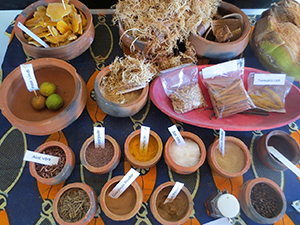 The Seaweed Center is a small business that has organized around the female seaweed farmers, to make organic beauty and medicinal products. With the sale of these boutique products, they have increased the wages of the women who work there from $1 a day to $8 a day. They provide educational opportunities for the women to learn English, and other subjects, and they rescue women from abusive relationships. Currently, the Center employs 10 women, but their goal is to involve up to 450 seaweed farmers. Even more women become involved in making the other ingredients that go into the products like coconut oil and beeswax.
The Seaweed Center is a small business that has organized around the female seaweed farmers, to make organic beauty and medicinal products. With the sale of these boutique products, they have increased the wages of the women who work there from $1 a day to $8 a day. They provide educational opportunities for the women to learn English, and other subjects, and they rescue women from abusive relationships. Currently, the Center employs 10 women, but their goal is to involve up to 450 seaweed farmers. Even more women become involved in making the other ingredients that go into the products like coconut oil and beeswax.
As the seaweed mamas have been creating new products, they have added more of Tanzanian traditional medicines like lemongrass, turmeric, and clove to their product lines, but they’re anxious to learn more herbal medicine, plant medicinal gardens, and learn more personal health care – especially nutrition. They are excited to partner with us for our global health students to build their programs.
This week, our NUNM students learned how to grow seaweed, harvest it, and turn it into soap, body scrubs, lotions, massage oils, and juices. I can imagine other students coming to do internships here on the beach in Zanzibar, learning herbal medicine from the seaweed mamas, and teaching nutrition in the large open-air porch.
I feel like we participated in our own hallmark “coming of age” movie on this trip with our friend Alice. Remember Alice? She’s our 20 year-old friend from Mowo. Just two weeks ago she lived in a village in the foothills of Kilimanjaro. Last week she saw the ocean for the first time in Tanga. And today, I taught Alice to swim in the Indian Ocean. Alice has truly transformed. In the village, she was shy, answered in one syllable words or grunted, and looked disinterested or bored most of the time. Since coming to Zanzibar, she’s blossomed. She has friends her own age, she had her hair done in corn rows, which took 18 hours, and a perpetual smile is on her face. She’s using her broken English to communicate constantly and tells us how happy she is. She is planning to stay in Zanzibar after we leave and will get a job at a guest house or a hotel. If I had more time, I might write the screenplay…
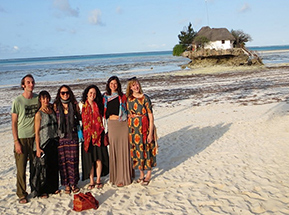 We’re winding down the trip now, and are on to the topics of culture shock and reverse culture shock. For intense discussions like these, we chose a beautiful restaurant called “The Rock” which can only be reached by boat at high tide. Of course, it happened to be low tide when we arrived, so we picked our way along the coral to reach the restaurant.
We’re winding down the trip now, and are on to the topics of culture shock and reverse culture shock. For intense discussions like these, we chose a beautiful restaurant called “The Rock” which can only be reached by boat at high tide. Of course, it happened to be low tide when we arrived, so we picked our way along the coral to reach the restaurant.
Culture shock is an interesting phenomenon. Sometimes people recognize when they’re experiencing it, but usually they don’t. Maria and I have recognized it in the students, other faculty, and even ourselves over the past many trips. While lots of books divide culture shock into phases with different behaviors associated with different phases, we’ve observed a lot of variety depending upon the student and their past travel experience. I think for myself, I experience more reverse culture shock when I get back to the US and see price tags on things, watch how people treat each other, and find myself back in front of a computer screen for 10 hours a day.
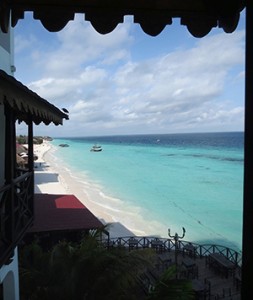 The students were asking me what I love about Tanzania and why I keep coming back. I think initially I wanted to be in Tanzania because I wanted to make a difference. But years ago I realized, I won’t change Africa – and what an ego I must have had to believe that I could – or that I should! I can help, certainly, and I will continue to help anyone I can in this country and in others. As I get to understand the culture more, I see more where my skill sets are needed.
The students were asking me what I love about Tanzania and why I keep coming back. I think initially I wanted to be in Tanzania because I wanted to make a difference. But years ago I realized, I won’t change Africa – and what an ego I must have had to believe that I could – or that I should! I can help, certainly, and I will continue to help anyone I can in this country and in others. As I get to understand the culture more, I see more where my skill sets are needed.
But why I love to come to Tanzania is not to change Tanzania, but because Tanzania changes me – changes how I interact with the world. There’s a different level of being alive and being fully present that is required in Tanzania. The daily challenges are different. And I love solving the puzzles when the challenges arise. Being here requires that you let go of expectations because things don’t happen the way that they’re planned; and that has always been a challenge for my Capricorn organized brain. But usually the way that things resolve are exactly right – even if it wasn’t what I initially wanted. I’ve learned to appreciate every little success along the way, and every smile I encounter.
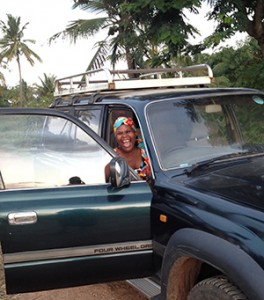
The relationships are different too. People are so generous with their kindness, their time, their helpfulness. Let me give you an example. On our last evening in Tanga, we had a little party to say good-bye to our new friends and celebrate Eliphas’ birthday. Happiness was giving me, Maria, two of the dadas, and the baked potatoes a ride to the house from Capricorn. We’d cooked the potatoes at Capricorn because there wasn’t enough oven space at the student house. As we reached the end of the driveway, the tire got a puncture and went completely flat. The dadas just laughed, put the potatoes on their head, and started walking to the house. When we arrived at the house, Eliphas asked what happened and we told him. He immediately dropped everything and went to help Happiness change the tire – during his birthday celebration – because it was getting dark and that’s what needed to be done. Eliphas had never met Happiness before. But that doesn’t matter. You help each other here.
I wish I experienced this more in the US, but our emphasis is more on being productive. Productivity has a different scale in Tanzania. Sometimes being productive is locating some tomatoes during the day during Ramadan – it’s not easy to do. And I don’t think I can explain the level of compassion that I experience daily from people here. Again and again on this trip and others we have had friends and strangers go out of their way to make us happy. Taking my cue from the people here, I have been working to create more time for relationships in my US life. I have so much gratitude for the lessons I have learned here. And I think that they make me a better person. I hope they do. That’s why I’ll continue to come here – to learn and grow and become a better person.
I’ve been sick again, but I don’t want anyone to worry. Dr. Maria is working her magic and I’m certain to be on my feet again in no time. Plus, it means I get more lime and coconut, and who can complain about that? ‘You put the lime in the coconut and drink it all up…’
This is likely my last letter from Tanzania this year. Tomorrow is our final class day, and then Maria and I will spend a day with Julius and his family on our way to Zambia and then Zimbabwe. I will write more from there.
In the meantime, I’m sending you all health and well-being…
Upendo,
Heather
